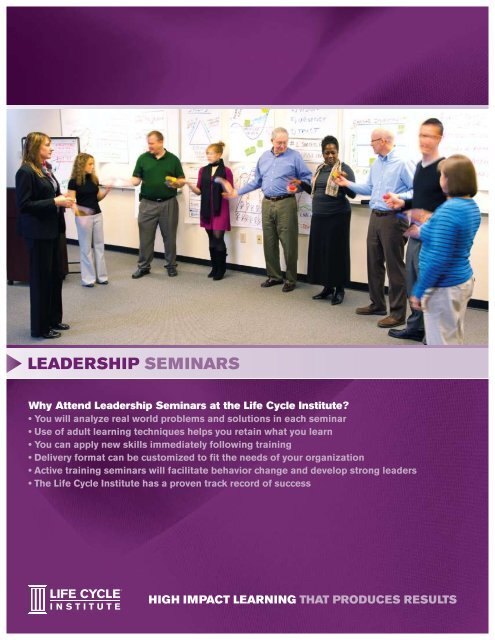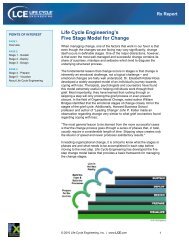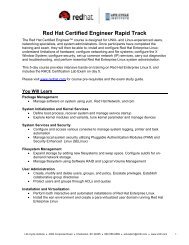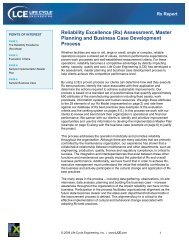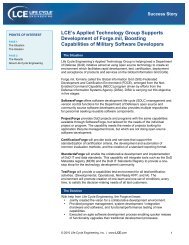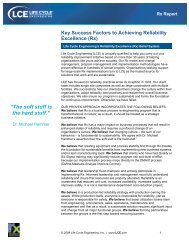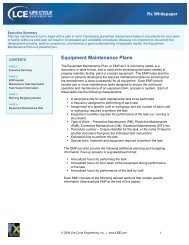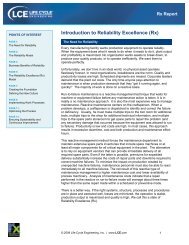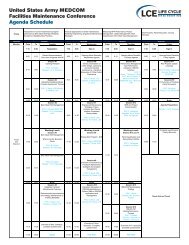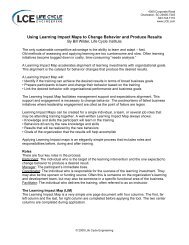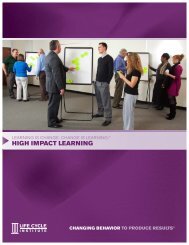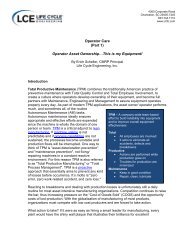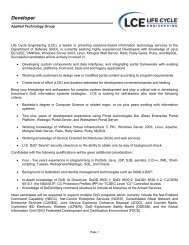Leadership Seminars Brochure (PDF) - Life Cycle Engineering
Leadership Seminars Brochure (PDF) - Life Cycle Engineering
Leadership Seminars Brochure (PDF) - Life Cycle Engineering
Create successful ePaper yourself
Turn your PDF publications into a flip-book with our unique Google optimized e-Paper software.
<strong>Leadership</strong> seminars<br />
Why Attend <strong>Leadership</strong> <strong>Seminars</strong> at the <strong>Life</strong> <strong>Cycle</strong> Institute?<br />
• You will analyze real world problems and solutions in each seminar<br />
• Use of adult learning techniques helps you retain what you learn<br />
• You can apply new skills immediately following training<br />
• Delivery format can be customized to fit the needs of your organization<br />
• Active training seminars will facilitate behavior change and develop strong leaders<br />
• The <strong>Life</strong> <strong>Cycle</strong> Institute has a proven track record of success<br />
High impact learning that produces results
<strong>Leadership</strong> <strong>Seminars</strong><br />
<strong>Leadership</strong> skills are critical to the success of any organization. These skills are often<br />
undeveloped and managers are expected to build these skills on their own. Employees are<br />
frequently promoted to supervisory positions because of their strong technical expertise.<br />
Suddenly, the supervisor needs new expertise—how to lead people.<br />
The <strong>Leadership</strong> <strong>Seminars</strong> offered by the <strong>Life</strong> <strong>Cycle</strong> Institute will help managers develop the<br />
leadership skills they need to be successful. Whether the deficiency lies in communication,<br />
leadership, conflict management, time management or presentation ability, these seminars<br />
will help you meet your learning objectives.<br />
Each of the available seminars targets a specific problem area faced by many managers.<br />
The learning environment is relaxed so that each person can adapt his own style to the<br />
skills learned. The <strong>Leadership</strong> <strong>Seminars</strong> guide you through activities and exercises that<br />
help you understand your values and natural leadership talent, thus building your ability<br />
to lead yourself. This is followed by learning tools and methods for determining the needs<br />
of others. Finally, you will learn how to adapt your natural talent to lead people and achieve<br />
a shared vision.<br />
The type of delivery for each seminar can be tailored to your needs. Whether you<br />
choose a full day seminar or a Lunch and Learn, the objectives can be customized to<br />
fit your timeframe.<br />
You will learn how to:<br />
• Communicate with diplomacy and tact<br />
• Become a more persuasive<br />
communicator<br />
• Be an effective leader<br />
• Manage time more efficiently<br />
Who should attend:<br />
Everyone in your organization can gain<br />
value from these seminars<br />
Delivery Options:<br />
• Lunch and Learn<br />
• 2 Hours<br />
• ½ Day<br />
• 1 Day<br />
• Webinars<br />
• Custom Learning and Development<br />
High Impact Learning: Change Behavior to Achieve Results<br />
Learning takes place when someone changes his<br />
behavior to achieve a desired result. Changing behavior<br />
means more than remembering and comprehending what<br />
you learned; it means applying it. The <strong>Leadership</strong> <strong>Seminars</strong><br />
incorporate High Impact Learning to maximize results. As<br />
part of the learning initiative, you will discuss real world<br />
problems and solutions in relation to the course topic.<br />
Two factors heavily influence the extent to which the<br />
training is applied—retention and management support.<br />
When retention strategies and management support<br />
beyond the classroom experience are included in the<br />
learning initiative, the application of new knowledge<br />
and skills will be very high.<br />
Learning retention is influenced by how active the<br />
participant is in the learning process and repetition of the<br />
content vital to fulfilling the learning objective. <strong>Life</strong> <strong>Cycle</strong><br />
Institute facilitators will teach you how to apply knowledge<br />
and skills learned in the classroom on the job to<br />
exponentially increase retention.<br />
Further, successful implementation of newly learned<br />
leadership skills depends on management support.<br />
Employees and managers will learn how to identify<br />
measurable action plans to guide desired results.<br />
Achievement of these mutually agreed-upon goals<br />
should be the measure of success for any learning<br />
program.<br />
800-556-9589 | education@LCE.com | www.LCE.com
<strong>Leadership</strong> <strong>Seminars</strong><br />
Truly great leaders possess excellent interpersonal skills, are effective<br />
communicators and have expertise in their area of specialty. For most<br />
managers, however, these skills are not innate; they must be learned.<br />
Each person has his own strengths and shortcomings, which is why the<br />
<strong>Life</strong> <strong>Cycle</strong> Institute offers a variety of seminars for improving leadership<br />
skills. We understand that because individual needs vary, some may<br />
require an in-depth seminar while others are looking for only an overview<br />
of the topic. For this reason the following seminars can be tailored to fit<br />
any time frame and budget from a Lunch and Learn to a full day delivery.<br />
Employee DevelopmenT:<br />
Motivating Employees to be Their Best: Learn strategies for<br />
motivating employees according to your leadership style. Identify<br />
factors that affect motivation both positively and negatively. Encourage<br />
community and openness, teach groups to learn from their mistakes,<br />
encourage groups to take initiative.<br />
The Art of Successful Coaching: Establish a sound performance<br />
improvement system, learn the five approaches to coaching, follow<br />
the four-step preparation process for conducting a coaching session,<br />
implement steps for effective coaching. Enhance team trust, respect<br />
and empowerment. Learn to set meaningful team goals.<br />
Performance Management: Understand the elements of an effective<br />
performance management system. Help employees establish clear,<br />
measurable, attainable performance goals. Provide feedback that will lead<br />
to improvement. Follow a discipline plan for performance problems.<br />
Communication SKILLS:<br />
The Art of Influencing Others: Use communication to build rapport,<br />
develop genuine relationships and resolve conflicts. Learn how to use<br />
both verbal and nonverbal messages to be more influential with others.<br />
Communication Skills for Emerging Leaders: Get familiar with<br />
the strengths and shortcomings of your communication skills. Use this<br />
information to build rapport and communicate more effectively. Prepare<br />
effective and appropriate business documents, establish a protocol for<br />
electronic communication and prevent unnecessary conflict.<br />
How to Develop and Deliver Dynamic Presentations: Enhance<br />
your presentation skills by creating audience appeal, defining objectives<br />
and maintaining the attention and interest of the audience. Determine<br />
how to select the appropriate delivery method. Conduct evaluation to<br />
further improvement.<br />
Planning and Managing Tasks:<br />
Time Management: Understand the relationship between personality<br />
preferences and time management styles. Implement strategies to<br />
overcome procrastination and recognize its causes. Manage to-do lists,<br />
incoming paper and clutter. Apply time-saving techniques, automate tasks<br />
and learn effective ways to prioritize tasks.<br />
Meeting Management: How to prepare for and conduct effective<br />
meetings. Build an effective agenda, begin and end meetings on time,<br />
avoid distractions, solve problems in a group, generate productive<br />
discussions, handle “problem” personalities and increase accountability<br />
for tasks.<br />
Leading Through Change: Identify change and the different<br />
reactions to it. Evaluate the affect change will have on people within<br />
the organization. Recognize change resistance and the eight mistakes<br />
companies make during change. Develop change strategies, a change<br />
communication plan and align systems and structure to change.<br />
Team Dynamics:<br />
Managing Teams: Determine fundamentals for establishing a<br />
team, team roles, personality types and leadership responsibilities.<br />
Hold effective meetings, lead through coaching and enhance decisionmaking.<br />
Learn to appropriately handle conflict and communication<br />
issues. Establish metrics for measuring team success and aptly<br />
reward accomplishments.<br />
Conflict Management: Understand the two basic types of conflict,<br />
four typical approaches to conflict and steps to conflict resolution.<br />
Employ strategies for dealing with challenging people and learn to<br />
handle specific situations with tact.<br />
Self-Awareness:<br />
Increasing Your Emotional Intelligence: Understand the<br />
consequences of unmanaged emotions. Increase your empathy and<br />
social skills and practice techniques to achieve greater self-awareness,<br />
self-control and self-motivation. Recognize how emotional intelligence<br />
can enhance employee relationships and increase production.<br />
Adapting Your Style: Learn to be an effective leader by influencing<br />
others, recognizing style differences in others and providing feedback<br />
to different style types. Facilitate effective meetings and motivate<br />
employees according to their individual needs.<br />
High impact learning that produces results
Speed of Trust ® Simulation<br />
In a trusting environment people feel good. They do not have to spend<br />
their time negotiating lengthy contracts or following up to make sure<br />
things are done. Trust is speed. Speed is a competitive advantage<br />
and produces results.<br />
Trust is a requirement for successful governments, businesses and personal relationships.<br />
In an environment where change is constant, virtual teams are the norm, diversity is<br />
prevalent and all are expected to do more with less; trust is the common denominator<br />
of project speed and success.<br />
Speed of Trust ® is a one-day discovery learning board simulation based on Stephen M. R.<br />
Covey’s book of the same title.<br />
The Speed of Trust ® teaches participants pragmatic, practical and actionable skills the<br />
learner can implement immediately, regardless of their role in the organization.<br />
This highly interactive Business Simulation engages leaders at all levels in the real work of<br />
identifying and closing the trust gaps that exist in many organizations. Instead of continuing<br />
to pay an outrageous trust tax, they can begin to realize the great benefits of a trust<br />
dividend both personally and organizationally.<br />
This creates an opportunity for individuals to prepare themselves to fill the leadership<br />
shortage and provides a proven process for companies to increase the bench strength of<br />
their organization by developing critical leadership skills in their key people. The Speed of<br />
Trust ® dramatically enhances leadership capability by teaching The 13 Behaviors of High<br />
Trust Leaders and how to imbed them into their daily interactions.<br />
Speed of trust ® simulation:<br />
Learners are grouped in table teams of four. Each four-person table team leads a team.<br />
They are introduced to their team through profile cards. Their challenge is to manage a<br />
project to market on time and on budget, while building a high-trust culture. As they are<br />
faced with scenarios and decisions, they must determine the impact on their relationship<br />
with each team member and stakeholder, as well as the impact on the project time<br />
and budget.<br />
One key message in the program is that trust always impacts two quantifiable outcomes:<br />
Speed and Cost. Cost is certainly measured in financial terms but also in terms of personal<br />
energy and resource usage. The formula introduced is that as trust increases, speed<br />
increases and costs decrease. Conversely, as trust decreases, speed decreases and<br />
costs increase.<br />
learn how to:<br />
• Discover the compelling advantages<br />
of trust<br />
• Experience the impact of trust on<br />
speed and cost<br />
• Identify the impacts of low trust and<br />
the benefits of high trust on people<br />
and organizational performance<br />
• Apply the critical behaviors that<br />
establish and grow trust<br />
• Assess the level of trust you have<br />
with others and create action plans<br />
to establish, grow, extend and<br />
restore trust<br />
• Build your Trust-o-Gram<br />
• Continue learning after the workshop<br />
with your copy of The Speed of Trust –<br />
One Thing That Changes Everything,<br />
by Stephen M. R. Covey<br />
Who should attend:<br />
People who are expected to produce<br />
results through people – including<br />
managers, supervisors, formal and<br />
informal team leaders.<br />
<strong>Life</strong> cycle institute:<br />
Be prepared to be an active learner.<br />
When you invest in training with the<br />
<strong>Life</strong> <strong>Cycle</strong> Institute, you will gain<br />
knowledge and learn skills that you<br />
will be able to apply immediately.<br />
Our courses are designed to teach by<br />
doing. Your training with the <strong>Life</strong> <strong>Cycle</strong><br />
Institute is different because we offer:<br />
• Facilitators who practice what they<br />
teach and teach what they practice<br />
• Course content that is constantly<br />
updated with the latest proven tools<br />
and methods<br />
• Adult learning methods that minimize<br />
lecture and emphasize learning<br />
by doing<br />
• Classrooms that are specifically<br />
designed to facilitate learning<br />
To learn more about the <strong>Life</strong> <strong>Cycle</strong> Institute, contact: 800-556-9589 | education@LCE.com | www.LCE.com


